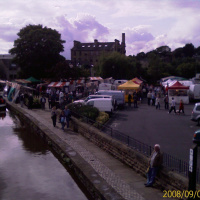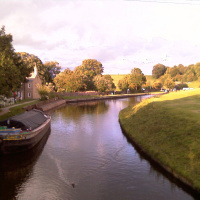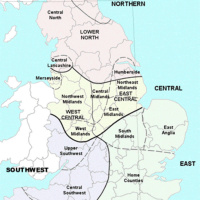Sinopsis
MY E MAIL alan_r_palmer@hotmail.comBonjour, Guten Tag, Buenos dias, Bom dia, goedendag, , Jó napot......I love learning languages and in discovering all the opportunities that the Internet gives us to develop our language skills. I will post mostly in English, but don't be surprised if some of my podcasts are in other languages...Please leave feedback if you have time - it's great to receive it I might see you on www.livemocha.com or MSNYour chathost Alan (November 2008)
Episodios
-
*******Last podcast for this website******
01/04/2009 Duración: 10minHello everybody, This is the last article I will put on this website as it is full! My new site is: www.language-explorer.co.uk See you there!! Bye Alan
-
How much speaker how much learner?
21/03/2009 Duración: 03minHello again Today I want to make a suggestion about how we can make a decision on our language skills. People say “I am a learner of English,” “ I am learning French”, “I learn Italian” etc This means that we think of ourselves as “learners” , “students” “pupil” Then people may say: “I am a beginner of Chinese” “I speak some German” “I can get by in Russian” All the time we make these sorts of statements to other people, particularly native speakers, we make a judgement of our ability and class ourselves as a “learner”. I want to suggest that we think of ourselves as both learner AND speaker. This way we can make a judgement in a different way which I believe will help us improve and enjoy language. For example I would say that I am 80% speaker of French and 20% learner I would say that I am 60% speaker of German and 40% learner I would say that I am 10% speaker of Chinese and 90% learner I would say that I am 5% speaker of Spanish and 95% learner This rating changes as we feel we know more and a
-
Relaxing Challenges
16/03/2009 Duración: 05minHello everybody Today I want to talk about an idea for learning I call "Relaxing Challenges" Remember when you were a child and you liked to play? Sometimes you dared yourself to try things: climb a tree, make a snowman, build a sandcastle, catch a ball. Each of these sort of things were a physical challenge. Some other things were mental challenges: playing chess, making a jigsaw, drawing and painting. Learning a language is a big challenge. It is a huge undertaking; building up vocabulary, pronunciation, writing a text, reading a book, listening to speech and also speaking ourselves are all different challenges with language learning. When I refer to a "relaxing challenge" I don't mean having a rest. I mean setting ourselves a small challenge with a relaxed mind, but with an energetic and enthusiastic intention. For a language learning "relaxing challenge", we can think of something to do with the language we are learning that challenges us for a short while, but doesn't tire us out completely. Some e
-
Reading and Listening Practice (Article about tea)
01/12/2008 Duración: 05minChina, the homeland of tea It is universally acknowledged that China is the original tea-growing area, as well as the first country to grow, produce and drink tea. In the Song (960-1279) and Yuan (1271-1368) Dynasties a popular custom was tea appraising. Over the long history of drinking tea, a special and simple Chinese tea culture came into being. Drinking tea was not only for quenching thirst or for enjoyment, but also for the promotion of friendship and mutual understanding. Folk customs of drinking tea reflected the ancient Chinese people's great interest in tea culture. (to appraise – to value, to judge) to quench- to satisfy (mutual – common) People often used tea as a betrothal gift; for it could not be "transplanted." After accepting tea as a betrothal gift, a girl could not capriciously change her decision to marry her fiancé. Betrothal – promise of marriage capricious – impulsive - reckless Entertainment of guests to tea is the most fundamental social behavior in the Chinese people's contacts with
-
More advice on English pronuciation
21/11/2008 Duración: 15minHello everybody. Alan here. Thanks for listening to my podcast. www.alanlancs1.podomatic.com Today I want to talk about some of the difficulties with English pronunciation. There are certain letters or combination of letters that are often difficult for people learning English. I want to demonstrate some of these difficulties and ways to help your pronunciation sound more English. Firstly, I must say that I speak with a northern English accent and as such, my English pronunciation is a little bit different to London English or American English. So let’s start with some vowel sounds. A E I O U In English, we cannot just read word and know how it is pronounced. Take the word “right” for example. The “righ” is pronounced like the word “rye” or the “ri” in the word “sterile” So we must always learn the correct pronunciation from teachers, recordings or from dictionaries that use the International Phonetic Alphabet (IPA) So, which are the most common sounds that can often be pronounced differently by peop
-
40 minutes a day language learning
16/11/2008 Duración: 08minHello everybody. The transcript for this is the next podcast. You can download it as a PDF text document. Bye for now Alan
-
**ADVANCED ENGLISH" (Article: Language learning")
12/11/2008 Duración: 08minHello everybody. You can download the transcript for this podcast by clicking "download" on the next podcast ***TRANSCRIPT*** PDF format Take care Alan
-
More on introductory phrases for opening a conversation
09/11/2008 Duración: 06minHello everybody. It’s been a while since I made a podcast. Today I wanted to give you some suggestions on how to start conversations with native speakers of English, or if you cannot find a native speaker to speak with, then try them out on anyone else you know who will speak English with you. Good luck! Take care Be good be happy Conversation starters…for students of different levels Beginning students “Please tell me about your family.” “What do you do? (student, worker, etc.) Where?” “Where do you live? Do you like it there? Why or why not?” “What did you do yesterday?” “What do you plan to do tomorrow?” “Please tell me how to get from here to your house (or the university or some hotel etc.)” “What do you like to do with your free time?” Intermediate students (can also use the above questions) "What did you do yesterday, from the time you got up to the time that you went to bed?” “Why did you choose to study _______?” “What would you like to be doing five years from now?” “Tell me about a time when you tr
-
Poem - "The Donkey"
16/10/2008 Duración: 42sThe Donkey I saw a donkey One day old His head was too big For his neck to hold; His legs were shaky And long and loose, They rocked and staggered And weren’t much use He tried to gambol And frisk a bit But he wasn’t quite sure Of the trick of it His queer little coat Was soft and grey, And he curled his neck In a lovely way. He looked so little And weak and slim I prayed the world Might be good to him. Anon.
-
Intonation practice
07/10/2008 Duración: 01minI explain a little more about using intonation in English Hello everybody I thought that today you might be interested in listening to English intonation. English has two main "tones": a "rising" tone for questions, and a "falling" tone for statements and commands. Father: "Are you not going to play with your friends today?" Son: "No, I'm not" (slight falling sound on "not") Father: "Why not?" Son: "Because I feel ill" Father: "Oh dear! what is wrong? Son: "I fell over and banged my head and I have a headache!" Father: "Ok, I think you need to rest!..." question sound: "today?" statement: "I'm not" question: why not? (sympathetically) statement "I feel ill" question: "what is wrong?" statement: "I have a headache" command: "you need to rest!" This dialogue shows how we use the falling and rising tones for conversation a bit clearer.
-
Weekend words October 4th
04/10/2008 Duración: 14minI hope you like my chatcast. It's a bit longer than usual and I'll put a text here in a couple of days. Be good be happy (BGBH) Alan
-
Making a nice cup of English tea
18/09/2008 Duración: 08minHow to make a perfect English cup of tea http://www.bellaonline.com/articles/art39370.asp Guest Author - Hellie T. One of the things you need to be able to do is to sit down and enjoy a really good cup of tea. As a tea drinker myself I drink tea at breakfast, eleveneses, lunch, afternoon tea and quite often in the evening as well! This gives you plenty of opportunities to enjoy a cuppa in your garden. To make a really delicious cup of English tea - just follow the instructions below. Please note that if your tap water is heavily chlorinated it will make the tea taste horrid and you will need to filter the water before boiling it. Make a Pot of Tea to drink in your English Garden · Put freshly drawn cold water into the kettle – never use water that has been boiled more than once – and make sure your kettle is kept clear of scale · Boil the kettle. · Pour a little boiling water into the empty tea pot – swirl it around carefully to warm it up. Pour away this water that you used to warm the pot. · Put tea
-
French Song "L'auvergnat"
13/09/2008 Duración: 03minHere is my version of "L'auvergnat" (Song for the person from the Auvergne) It was written and sung by Georges Brassens It is ano old French song - and I like it a lot I hope you like my version Bye for now Alan If you want the English words - just e-mail me at alan_r_palmer@hotmail.com
-
Local Markets
07/09/2008 Duración: 04minHello everybody, I have had some nice feedback from visitors to my site. I have realised that to help people with English, it is sometimes very useful to talk about cultural activities. Today I want to talk about small markets we have in some towns in England. Today, we went to a town called Skipton, near where I live. We visited a small market. This was called a “Farmers’ market”. It is where local produce can be sold. It is an alternative to supermarkets which are the shops where most people go shopping for groceries. However, these markets give people the chance to buy some produce made locally by private business owners and which can be very good – although more expensive that supermarket equivalents. The produce we saw today was: cheese, meats, fruit and vegetables, herbal oils, sweets (called fudge) and not just food, there was also pottery and jewellery. Also in the town was a European market. These are sellers from France and Germany. They sell speciality products also, but prices are more expens
-
Guitar tune: "Bubble and Squeak"
25/08/2008 Duración: 01minHere's a guitar tune I recorded today. I hope you like it It is called "Bubble and Squeak" This is actually a food we eat in England: Bubble and squeak From Wikipedia, the free encyclopedia http://en.wikipedia.org/wiki/Bubble_and_squeak Bubble and squeak (sometimes just called bubble) is a traditional English dish made with the shallow-fried leftover vegetables from a roast dinner. The chief ingredients are potato and cabbage, but carrots, peas, brussels sprouts, and other vegetables can be added. It is traditionally served with cold meat from the Sunday roast, and pickles. Traditionally the meat was added to the bubble and squeak itself, although nowadays the vegetarian version is more common. The cold chopped vegetables (and cold chopped meat if used) are fried in a pan together with mashed potato until the mixtu
-
Weekend words 24th August - Reading technique
25/08/2008 Duración: 03minHello everybody Alan here and welcome to www.alanlancs1.podomatic.com. And today I’m just speaking without a text. Usually, as you know, I prepare a text. To make it easier for me and also easier for you to read as I say the same things as I’ve written. But today I’m just doing a “chatcast” and what I mean by a chatcast is I just chat. I just speak about things I am interested in and hopefully you find it interesting too – well I hope so anyway. So today I’m going to speak about reading in a different language and just recently I was on holiday in France and I was reading some French newspapers and French books during the holiday and sometimes I find the text very difficult. In fact, very often I find it very difficult to follow the text as I would do in
-
Listening strategies #1
21/08/2008 Duración: 08minHello everybody, I’m back from my holidays in France. Today I want to talk about when people speak fast and what you can do to help understand what is spoken. I think listening is the most difficult skill of the four skills in language learning For example: With writing, we have the chance to decide what we want to write and spend time on this. With speaking, we have the chance to decide what we say With reading, we usually have the chance to read the text many times if we want to. I don’t mean that the other skills are easy, they are often very difficult. What I mean is that with listening to conversational speech we often have no control over it. To explain more details: Often the speaker has an accent We cannot control the speed of the words (unless we deliberately ask the speaker to slow down – and very often we can’t do that) Maybe the speaker is using slang or expressions – sometimes dialect words Maybe more than one person is speaking at the same time, for example at a dinner table M
-
Culture: Leeds and Liverpool canal
02/08/2008 Duración: 02minHello everybody This podcast is about the Leeds and Liverpool Canal. The Leeds and Liverpool Canal is the longest canal in Northern England at 127 miles (204km) long. It passes through 91 locks with a summit level of 487 feet (148 metres) http://www.penninewaterways.co.uk/ll/ll48.htm The canals of Great Britain are a major part of the network of inland waterways in the United Kingdom. They have a colourful history, from use for irrigation and transport, to becoming the focus of the Industrial Revolution, to today's role mainly used by pleasure boaters. Despite a period of abandonment, today the canal system in Great Britain is again in good shape, with many abandoned and derelict canals being reopened, and even the construction of some new routes under way. http://en.wikipedia.org/wiki/Canals_of_Great_Britain Along the canal bank is a nice place to walk in summer.
-
Weekend Words August 2nd "More on Accent"
02/08/2008 Duración: 12minHello everybody. Many people I speak with who learn English would like to know how to “improve” their English accent. It’s always difficult for me to advise on this subject. Every nationality has a certain accent when they speak English, including the English themselves. For those of you who are interested in the way we speak in Britain, here is a good website http://www.bbc.co.uk/voices/ To help answer the question, I’ve made a list of things to think about and I’ll discuss them a little here. What is an accent? http://www.buzzin.net/english/accent.htm This website says: Accent refers to a speaker's style of pronunciation. It may signal the regional or social identity
-
More on fluency and conversations
31/07/2008 Duración: 06minFluency - setting up a conversation Hello everybody. Today I want to talk about how to make your spoken English flow better and to help you with making it a little easier to talk to people, particularly native speakers. To have a good conversation you need to start well, enjoy the conversation and make it a two way thing and to find a good way to finish. This is useful and has nothing to do with the length of time you speak for. To start off a conversation, try to remember some good opening sentences: If you know somebody already… (informal) “How are you today?” “Nice to see you, how’s it going?” “What’s new? How are things?” “It’s good to see you” If you are meeting someone for the first time (formal) “It’s a pleasure to meet you, my name is…..” “Nice to meet you, my name is, how are you?” “Let me introduce myself, I’m……(name)” The next part is to let the other person do something similar and then you have names. If they use first names, then you can also use first names. The next stage is to giv

























